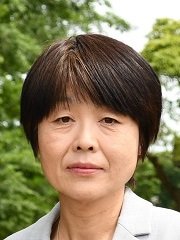Faculty Members
KAMEYAMA Yasuko
(Professor)
Sustainable Society Design Center/Sustainability Science

Career Summary
- 1990: Graduated from Faculty of Arts and Sciences (University of Tokyo)
- 1990-92 Tokio Marine and Fire Insurance Company
- 1992- National Institute for Environmental Studies
- 1999-2000: Visiting researcher at Department of Government and Politics University of Maryland (U.S.)
- 2006-2015:Visiting professor at Graduate School of Frontier Sciences (University of Tokyo)
- 2020: Director, Center for Social and Environmental Systems Research, National Institute for Environmental Studies
- 2022: Senior Principal Researcher (University of Tokyo)
- 2022: Professor (University of Tokyo)
Educational Activities
Graduate school:Sustainability Science
Research Activities
- International cooperation on climate change
Climate change has been indicated as an urgent global issue since the 1980s, and multilateral treaties such as the UN Framework Convention on Climate Change and the Paris agreement have been concluded so far. The problem, however, has not yet been solved. Why do countries have different positions on climate change? How are agreements between nations with different positions reached? What kind of agreement would be most effective to mitigate climate change? How do climate-related agreements differ form other global environmental agreements? These are research questions being faced. - Sustainability indicators
There is a growing understanding of sustainable development, but it is never easy to judge whether or not current situation is sustainable. The Sustainable Development Goals (SDGs) served to convey complex notion of sustainability in an understandable manner, but the 17 goals are interrelated to each other, and efforts to improve one goal could undermine another goal. The conditions for ensuring sustainability could also be different depending on the scale (global, country, region). Sustainability indicators are examined for measuring sustainability, especially at the national level of Japan.
Literature
- Box-Steffensmeier J.M, Burgess J., Corbetta M., … , Kameyama Y., et al. (2022) The future of human behaviour research, Nature Human Behaviour 6, 15-24.
- Kameyama Y. and Takamura Y. (2021) Editorial, “Climate Change and Security: Filling Remaining Gaps,” Politics and Governance 9(4), 1-4.
- Kameyama Y. (2021) “Climate Change Policy: Can New Actors Affect Japan’s Policy-Making in the Paris Agreement Era?” Social Science Japan Journal, 24(1), 67-84. Doi: 10.1093/ssjj/jyaa051. https://academic.oup.com/ssjj/article/24/1/67/6079283?guestAccessKey=ecf9ee28-6a0f-4a72-878a-bf9994d473fc
- Kameyama Y., and Ono K. (2021) “The Development of Climate Security Discourse in Japan”, Sustainability Science, 16(1), 271-281. doi: 10.1007/s11625-020-00863-1
- Kameyama, Y. (2021) “Net Zero Target”, World Energy, 49 July 2021. 38-41. https://www.eni.com/static/en-IT/world-energy-magazine/energy-games.html
- Kameyama, Y. (2021) “Feeling the heat: external pressure and Japan’s commitment to carbon neutrality”, East Asia Forum, June 11, 2021 https://www.eastasiaforum.org/2021/06/11/feeling-the-heat-external-pressure-and-japans-commitment-to-carbon-neutrality/
- Sakaguchi I., Ishii A., Sanada Y., Kameyama Y., Okubo A. and Mori K. (2020) “Japan’s environmental diplomacy and the future of Asia-Pacific environmental cooperation,” International Relations of the Asia-Pacific, 21(1) 1-36. Doi: 10.1093/irap/lcaa020. https://academic.oup.com/irap/advance-article/doi/10.1093/irap/lcaa020/6024964?guestAccessKey=79ba26f4-3344-40fa-9f8a-c0cc399c4872
- Kameyama, Y. (2020) “Emitters in the Spotlight - Japan: Innovation First, Climate Next,” Institut Montaigne Website, August 18, 2020 https://www.institutmontaigne.org/en/blog/emitters-spotlight-japan-innovation-first-climate-next.
- Chaiyapa W., Esteban M., and Kameyama Y. (2018) “Why go green? Discourse analysis of motivations for Thailand's oil and gas companies to invest in renewable energy”, Energy Policy, Vol. 120, 448-459.
- Kameyama Y. (2017) Climate Change Policy in Japan: From the 1980s to 2015, Abingdon: Routledge. ISBN 978-1-138-83859-8.
- Kameyama Y. (2017) “Remaining Research Agendas in the Post-2020 Period under the Paris Agreement”, Global Environmental Research, 21, 3-10.
- Kameyama Y., and Kawamoto A. (2016) “Four intermediate goals: a methodology for evaluation of climate mitigation policy packages”, Climate Policy, 18(2), 210-220, doi: 10.1080/14693062.2016.1258632.
- Kameyama Y., Sari A.P., Soejachmoen M.H. and Kanie N.eds. (2008) Climate Change in Asia: Perspectives on the Future Climate Regime, Tokyo: United Nations University Press.
Other Activities
- Board member of Society for Environmental Economics and Policy Studies, Japan
- Board member of Society of Environmental Science, Japan
- Editorial board member, Politics and Governance, Portugal
- Member, Science Council of Japan
Future Plan
I would like to encourage the young generation to participate in front-line research by connecting the educational space of Graduate School of University of Tokyo with the research field of national research institutions.
Messages to Students
There are various motivations to study. Some people are motivated simply wanting to know more, while others have other goals they want to achieve, and need to learn as a means to achieve them. The latter may more be the case for sustainability science. There are various problems in the society, such as environmental problems and poverty. We gain expert knowledge to help solve them. In such cases, while a wide range of knowledge is required, it is still necessary to deepen the academic field in which one can hold as his/her expertise. Please consider what academic field you would like to be an expert of, when studying at the University.
